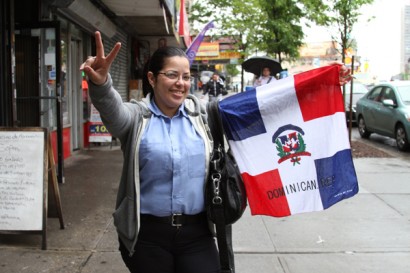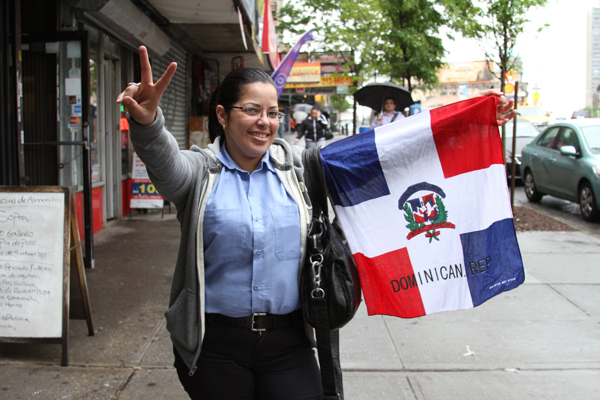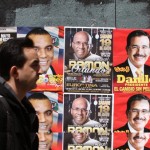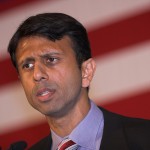
Claudia Sanchez with a Dominican Republic flag in New York. (Photo: Gerardo Romo/El Diario La Prensa)
The Dominican Republic holds presidential and congressional elections on Sunday. Under Dominican law, citizens who live outside the country are eligible to vote. New York’s large Dominican immigrant community could play a major role in determining the election’s outcome.
This story was written by Cristina Loboguerrero for El Diario/La Prensa and published on May 15, 2012. Translated from the Spanish by Maibe Ponet.
NEW YORK — For Dominican men, discussing politics is as popular as baseball. For Dominican women, becoming politicians is what the game is all about.
The increase in women’s participation in the island’s political scene, where this year three females are running for vice president, seems to be awakening interest among women here in New York.
“In Dominican Republic there’s a lot of machismo and men think women aren’t ready for politics. But advances are being made, and they’re earning their place,” said Nieves Luisa González, a 65-year-old Dominican who’s lived in New York for 24 years.
“We Dominican women, as much as men, live and breathe politics; it’s like a ball game. If you go to any political rally, you’ll see a ton of women,” said González.
Dominican women in the diaspora seem influenced by the effects of a long history of limited representation in their country of origin. They face a double challenge: obtain support from their political party and their colleagues, as well as fund raise, in addition to convincing their electorate—made up in great part by men—to vote for them.
This precedent is partly responsible for the fact that only two out of the nine Dominicans elected to legislative positions on the New York City Council are women.
Ordinary Dominican women are well aware of this. Belkis Cruz, who works at a print shop and lives in Upper Manhattan, quickly points out: “We need more female leaders; men think they have the power because they are men, but many of us women are well educated.”
María Teresa Feliciano, president of the Dominican American National Roundtable, described this situation as “masculine resistance against female leadership in politics.”
In the United States, Dominican women running for office face two main challenges. Political experts point out that electability –as it is for women in other cultures– is usually a result of a recognition process and an ability to fund raise, but for Dominican women it also means the ability to convince fellow Dominican voters, mostly men, to support them.
Councilwoman Julissa Ferreras, who represents the majority-Hispanic neighborhoods of Elmhurst, Corona and Jackson Heights in Queens, thinks the decision to run for political office “has many components, including being sure you can get elected.”
The role of women in politics, regardless of whether they obtain political office, has been historic and essential, according to sociologist Ramona Hernández, director of the Dominican Studies Institute of the City University of New York (CUNY).
“In a male society, it’s easier for men to raise funds for their campaign,” said Hernández, who explained that “no one wants to bet on someone who is going to lose, and first men have to be convinced that a woman can play her role well.”
Yudelka Tapia, who has run for the New York City Council twice, said an “ongoing struggle” must be maintained to obtain more positions in a society where “culturally, men have a built-in machismo, no matter which country they move to.”
However, Tapia, who began her political career in Dominican Republic, clarified that women’s inequality doesn’t only exist in the political realm or among Dominicans. “It’s a worldwide phenomenon, and while women are recognized for their abilities, there’s still a long way to go,” she said.
Fi2W is supported by the New York Community Trust and the John S. and James L. Knight Foundation with additional support from the Ralph E. Odgen Foundation and the Sirus Fund.




